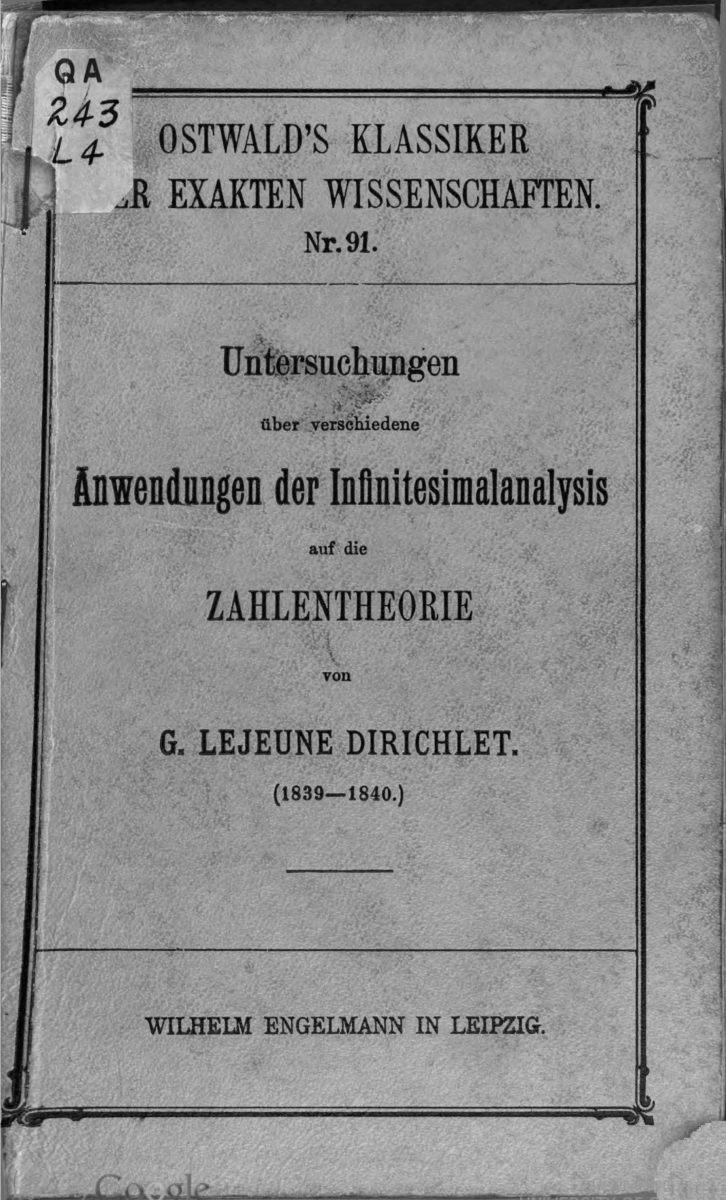- About MAA
- Membership
- MAA Publications
- Periodicals
- Blogs
- MAA Book Series
- MAA Press (an imprint of the AMS)
- MAA Notes
- MAA Reviews
- Mathematical Communication
- Information for Libraries
- Author Resources
- Advertise with MAA
- Meetings
- Competitions
- Programs
- Communities
- MAA Sections
- SIGMAA
- MAA Connect
- Students
- MAA Awards
- Awards Booklets
- Writing Awards
- Teaching Awards
- Service Awards
- Research Awards
- Lecture Awards
- Putnam Competition Individual and Team Winners
- D. E. Shaw Group AMC 8 Awards & Certificates
- Maryam Mirzakhani AMC 10 A Awards & Certificates
- Two Sigma AMC 10 B Awards & Certificates
- Jane Street AMC 12 A Awards & Certificates
- Akamai AMC 12 B Awards & Certificates
- High School Teachers
- News
You are here
Mathematical Treasure: Dirichlet on Number Theory

Johann Peter Gustav Lejeune Dirichlet (1805-1859) was a Belgian-born mathematician, noted for his work in algebraic number theory. He invented the algebraic structure known as an “ideal,” so fundamental in ring theory, and is also considered the founder of the theory of Fourier series. His Vorlesung uber Zahlentheorie (Lectures in Number Theory) was published posthumously, in 1863. The work was written in large part by Richard Dedekind, Dirichlet’s good friend, but is based on the work of Dirichlet himself.

Pages 34 and 35 (shown above and individually below) of Dirichlet’s lectures contain a discussion of modular arithmetic.


The Special Collections staff at the Linderman Library of Lehigh University in Bethlehem, Pennsylvania, is pleased to cooperate with the Mathematical Association of America to exhibit this and other items from the Library’s holdings in Mathematical Treasures. In particular, Convergence would like to thank Lois Fischer Black, Curator, Special Collections, and Ilhan Citak, Archives and Special Collections Librarian, for their kind assistance in helping to make this display possible. You may use these images in your classroom; all other uses require permission from the Special Collections staff, Linderman Library, Lehigh University.
Another treatise on number theory that Dirichlet wrote in 1839–1840, Untersuchungen über verschiedene Anwendungen Infinitesimalanalysis auf die Zahlentheorie (Studies on various applications of the infinitesimal analysis on number theory), was edited by the German mathematician Robert Haussner (1863–1948) and published in 1897 as issue 91 in the long-running series established by Leipzig physicochemist Wilhelm Ostwald (1853–1932), Ostwalds Klassiker der exakten Wissenschaften (Ostwald’s Classics of the Exact Sciences). The full text of this copy is available in GoogleBooks.

Frank J. Swetz (The Pennsylvania State University), "Mathematical Treasure: Dirichlet on Number Theory," Convergence (June 2014)




